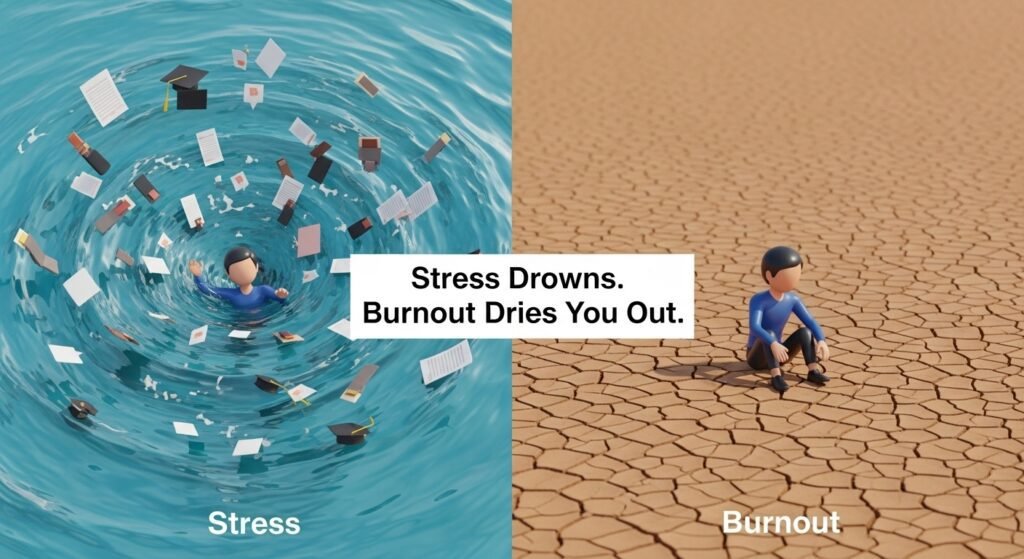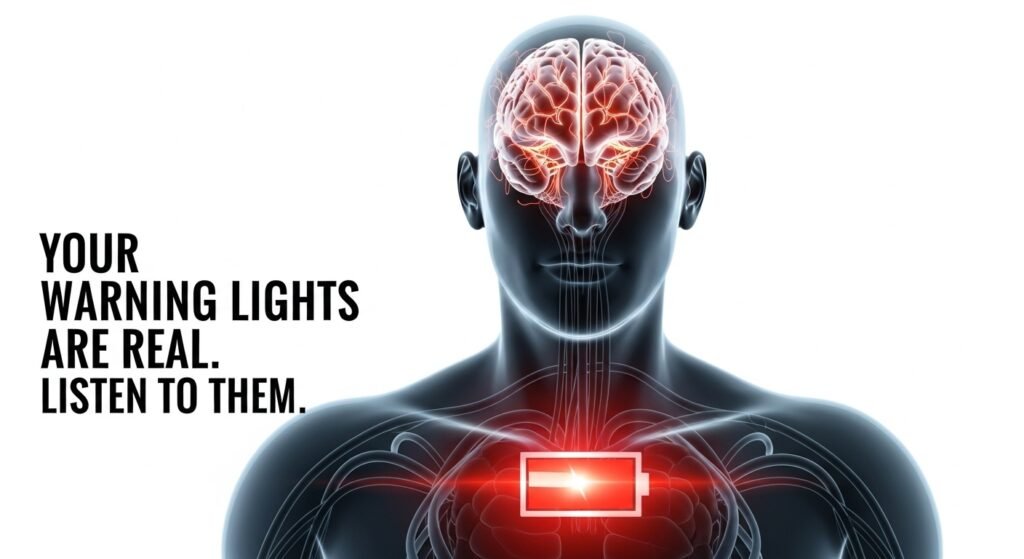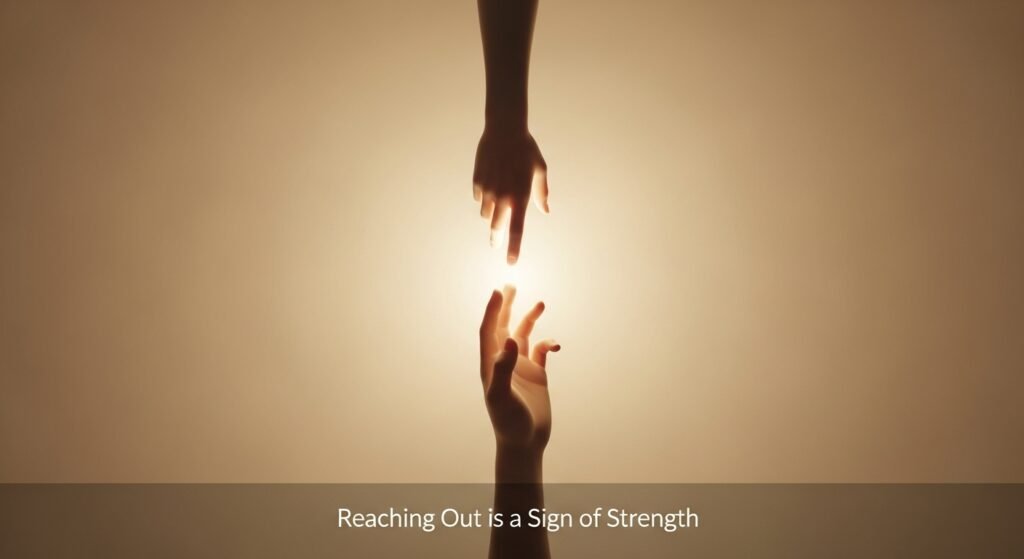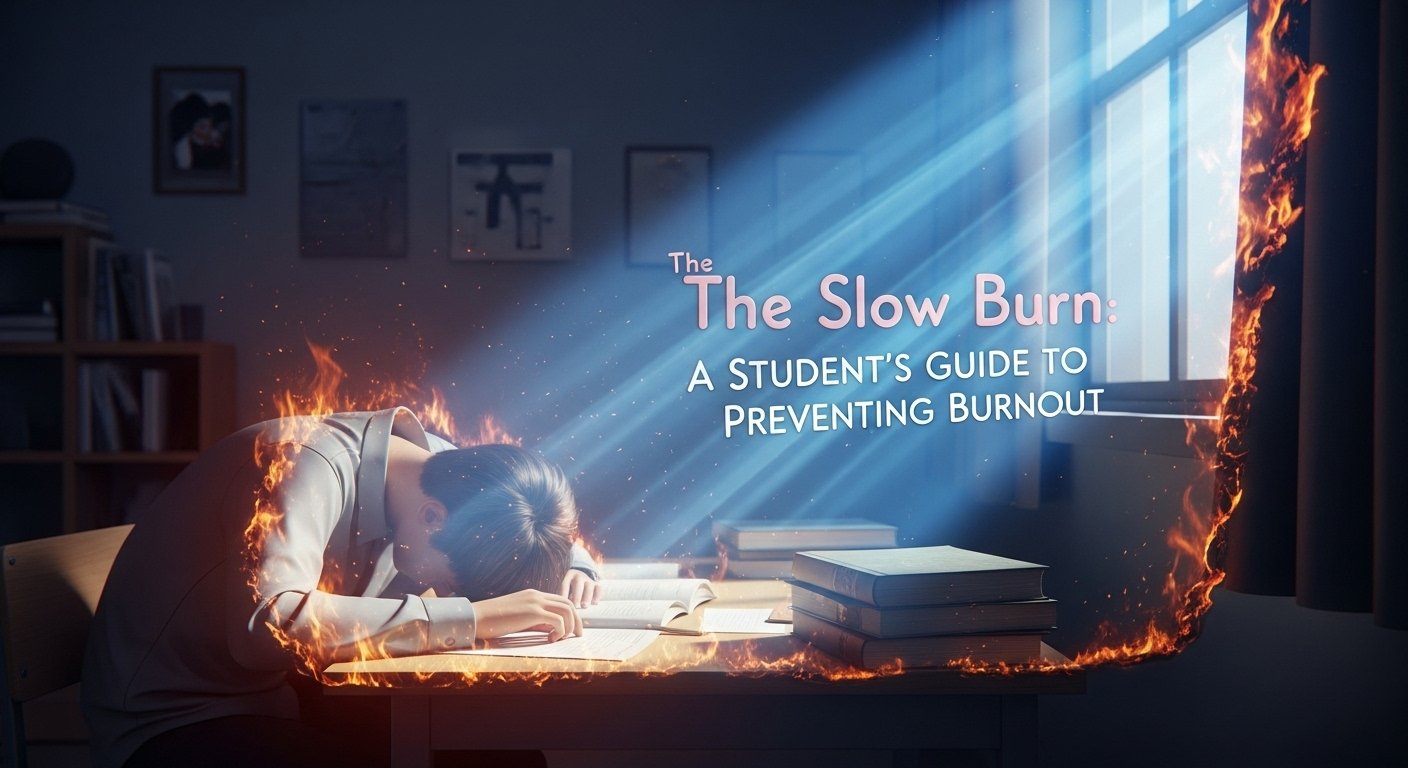The Slow Burn: Your Guide to Recognizing and Preventing Student Burnout
The screen blurs. The words on the page, once sharp and full of meaning, have dissolved into a meaningless soup. You take another sip of lukewarm coffee, the taste of stale caffeine doing little to cut through the thick fog in your brain. You’ve been “working” for hours, but your to-do list seems to have grown longer, and a quiet, heavy feeling of “I just don’t care anymore” has settled deep in your chest. This isn’t just a bad day or a bit of stress. This is the slow, creeping fire of burnout, and it’s one of the most significant challenges to student mental health today.
For too long, we’ve worn exhaustion like a badge of honour. We’ve romanticized the all-nighter and celebrated “the hustle,” often at the expense of our own well-being. But burnout is not a sign of weakness or a personal failure; it’s the predictable, human response to chronic, unmanaged stress. As students navigating the immense pressures of academia in 2025, learning how to protect our mental health isn’t a luxury—it’s the most critical prerequisite for success. This is your guide to understanding the signs of burnout, and more importantly, the proactive strategies you can use to prevent it, so you can finish your academic journey with your passion and your health intact.
Why Student Burnout Has Become an Epidemic
The pressure on students today is immense and multi-faceted. It’s a perfect storm of academic rigor, social pressures, financial worries, and the relentless hum of a 24/7 digital world. We’re expected to get perfect grades, build a flawless resume with extracurriculars, maintain a vibrant social life, and document it all beautifully on social media. This culture of “total productivity” has created an environment where rest feels like a rebellion and stopping feels like falling behind.
The World Health Organization (WHO) officially recognized burnout as an occupational phenomenon, defining it by three key dimensions:
- Feelings of energy depletion or exhaustion.
- Increased mental distance from one’s job (or studies), or feelings of negativism or cynicism.
- A sense of ineffectiveness and lack of accomplishment.
Sound familiar? This isn’t just end-of-semester stress. It’s a deeper, more pervasive state that can seriously damage both your academic performance and your overall mental health.

Are You Stressed or Are You Burned Out? A Crucial Distinction
We often use the words “stressed” and “burned out” interchangeably, but they are fundamentally different states. Recognizing the difference is the first step toward finding the right solution. Stress, in manageable doses, can be a motivator. Burnout is never a motivator.
| Stress | Burnout |
| Characterized by: Over-engagement, a sense of urgency, hyperactivity. | Characterized by: Disengagement, helplessness, emotional exhaustion. |
| The Feeling: It feels like you’re drowning in responsibilities. | The Feeling: It feels like you’re all dried up, with nothing left to give. |
| The Primary Damage: Physical (can lead to stress-related illness). | The Primary Damage: Emotional (can lead to detachment, cynicism, and depression). |
| The Mindset: “I just need to get through this one crazy week.” | The Mindset: “I don’t see the point in any of this anymore.” |
While chronic stress can certainly lead to burnout, understanding where you are on this spectrum is vital for your mental health.
Social Media’s Effect on Teen Mental Health

The Telltale Signs: How to Recognize Burnout in Yourself and Others
Burnout is a sneaky thief; it often arrives so gradually that we don’t notice it until it has already taken up residence in our lives. Being able to spot these early warning signs is a critical skill for protecting your mental health.
Emotional Signs
- Cynicism and Detachment: You start feeling disconnected from your studies, your friends, and activities you used to enjoy. A sense of “what’s the point?” starts to dominate your thinking.
- Irritability: You have a shorter fuse than usual. Small inconveniences that you used to brush off now feel like major catastrophes.
- A Sense of Dread: You feel a constant, low-grade anxiety or dread, especially when thinking about your schoolwork or upcoming deadlines.
Physical Signs
- Chronic Fatigue: This isn’t just feeling tired after a late night. It’s a bone-deep exhaustion that sleep doesn’t seem to fix.
- Trouble Sleeping: You’re either unable to fall asleep because your mind is racing, or you want to sleep all the time to escape.
- Increased Illness: Constant stress and exhaustion can weaken your immune system, meaning you might be catching more colds or feeling generally unwell more often.
- Headaches and Muscle Pain: Chronic tension can manifest as physical pain in your head, neck, and back.
Behavioural Signs
- Rampant Procrastination: You avoid tasks, even simple ones, because you just don’t have the mental or emotional energy to start.
- Social Withdrawal: You start cancelling plans with friends and isolating yourself because socializing feels like another draining task on your to-do list.
- Performance Dip: You’re putting in the long hours, but your grades are slipping. You’re less efficient, you make more careless mistakes, and you can’t seem to focus.
If this checklist is hitting a little too close to home, please know that you are not alone, and there are proactive, tangible things you can do to reclaim your energy and well-being.
The Proactive Playbook: 4 Mental Health Strategies for Burnout Prevention
The best way to deal with burnout is to prevent it from happening in the first place. This requires a conscious shift from a reactive to a proactive approach to your mental health. These aren’t quick fixes; they are sustainable lifestyle adjustments.
1. Redefine “Productivity”: The Art of Strategic Rest
Our culture is obsessed with productivity, but it misunderstands what actually fuels it. True productivity is not about working more hours; it’s about working smarter and resting better.
- Schedule “Do Nothing” Time: Intentionally block out time in your calendar for true, unproductive rest. This isn’t time to scroll through social media (which can be draining). It’s time to lie on the grass, listen to music, or just stare out a window. Let your brain be bored; it’s essential for creativity and restoration.
- Cultivate a “Joy-Only” Hobby: Engage in an activity that has absolutely no goal other than your own enjoyment. No resume-building, no “personal branding.” Whether it’s painting, playing an instrument, or joining a casual sports league, a joy-only hobby is a powerful antidote to the pressure of constant self-improvement.
Social Media’s Effect on Teen Mental Health

2. Set Boundaries in a Boundaryless World
The digital age has blurred the lines between work, school, and life. Reclaiming those boundaries is a radical act of self-preservation.
- Create Digital “No-Fly Zones”: Designate specific times and places where schoolwork is off-limits. For example: no checking school emails after 9 p.m., or making your bedroom a “laptop-free” zone.
- Curate Your Information Diet: Your social media feed can be a huge source of stress and comparison. Unfollow accounts that make you feel inadequate and follow those that inspire or calm you. Use app timers to limit your time on draining platforms.
- Practice the Power of “No”: You don’t have to say yes to every study group, every social event, or every extra commitment. Your energy is a finite resource. Protecting it is not selfish; it’s essential for your mental health.
3. Escape the Perfectionism Trap: The 80% Rule
Perfectionism is the jet fuel of burnout. The desire to get a perfect 100% on every single assignment is an impossible and exhausting standard.
Embrace the 80% Rule. For most of your tasks, aiming for a solid, well-done 80% is far more sustainable than agonizing for hours over that last, perfect 20%. This doesn’t mean you shouldn’t strive for excellence on the things that truly matter, like a final project or a major exam. But it does mean giving yourself permission for a quiz or a small homework assignment to be “good enough.”
4. Reconnect With Your “Why”
Burnout thrives in a vacuum of meaning. When your schoolwork feels like a series of pointless, disconnected tasks, it’s easy to lose motivation.
Take some time to reconnect with your purpose. Why did you choose this major? What are your long-term goals? What aspects of your studies genuinely excite you? You can do this by:
- Journaling: Spend 10 minutes writing freely about your goals and passions.
- Talking to a Mentor: Have a conversation with a trusted professor or older student about their journey and what keeps them motivated.
- Connecting Your Work to the Real World: Find a documentary or a news article that shows how the concepts you’re learning are being used to solve real problems.
Top Mental Health Resources for College Students

When Prevention Isn’t Enough: Where to Find Help
Sometimes, despite our best efforts, burnout can take hold. If you feel like you are truly struggling and can’t pull yourself out of the fog, seeking help is the strongest and bravest thing you can do. It is a critical investment in your mental health.
- Your University Counseling Center: Most colleges and universities offer free, confidential counseling services for students. These professionals are trained specifically to help with issues like academic stress and burnout.
- National Helplines and Resources: You are not alone. Organizations exist to provide immediate, accessible support.
- The National Alliance on Mental Illness (NAMI) offers resources and support groups.
- The Crisis Text Line allows you to connect with a crisis counselor for free, 24/7, by simply texting HOME to 741741.
Please, do not hesitate to reach out. Talking to someone can make all the difference.
Conclusion: Your Well-Being is the Path to Your Success
For too long, we have treated our mental health as an afterthought—something to deal with only when it becomes a crisis. But the conversation is changing. We are finally recognizing that our well-being is not an obstacle to our success; it is the very foundation of it.
Preventing burnout is not about “toughing it out.” It’s about working smarter, resting deeper, and treating yourself with the same compassion and care you would offer a good friend. Your goal shouldn’t be to just survive your education; it should be to emerge from it as a whole, healthy, and inspired human being. And that is a goal worth fighting for.
What is one small boundary you can set for yourself this week to protect your energy and well-being? Share your commitment in the comments—we are all in this together.



